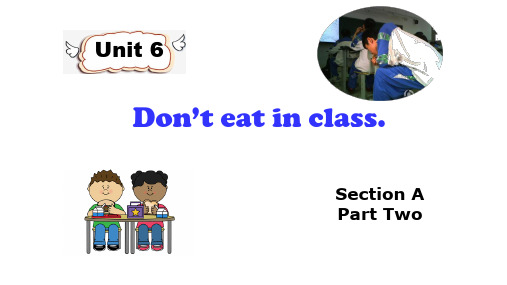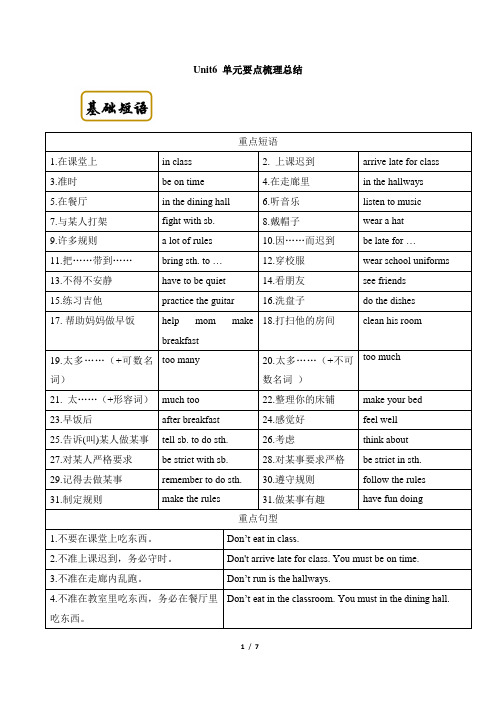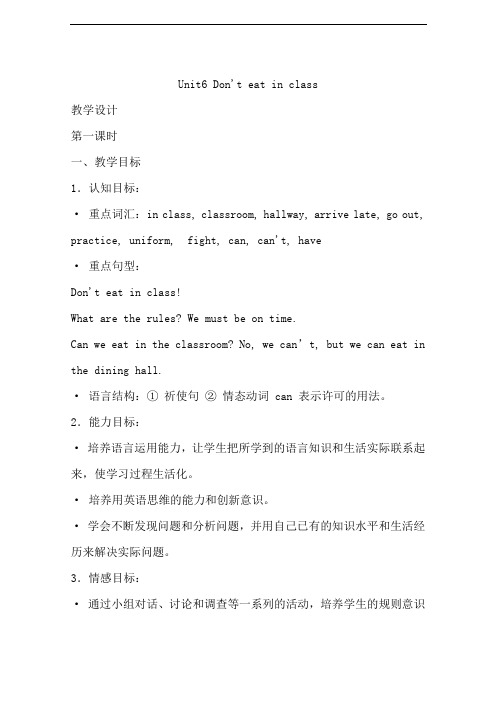最新鲁教版初一英语六年级下册知识点总结Unit 6 Don’t eat in class
鲁教版英语六年级下册-Unit6-Don't eat in class-SectionB-part

2) We have too much work to do. 我们有许多工作要做。
2. But I have to go to bed before 10:00.
1) go to bed “去睡觉”
What time do you usually go to bed? 你一般几点睡觉?
2) before: 介词,即not later than “最迟 在……”
9. She has to read a book before she can watch TV.
10. She has to go to bed before 10:00.
Pay attention to th书e信st称ru呼ct:urDeeoafr…th,e letter.
称呼后用逗号,而不用冒号 Dr. Know 意为 “全知博士”、 “ Dr万. =事d主o通c题t博or句士博”士,常使用缩写式
2. Molly _h_a_s_t_o_/m__u_s_t do her homework first when she gets home.
3. Molly _h_a_s_t_o_/m__u_s_t read a book after dinner before she _c_a_n__ watch TV.
Do some sports?...
鲁教版英语六年级下册-Unit6 Don't eat in class-Section A-Part

3. -Does he have to go to bed now? 肯定回答:Yes, 主语+do/does/did.
-Yes, he does. 否定回答:No, 主语+don’t/doesn’t/didn’t.
3c Make up five cool rules for your dream school. Share your rules with the class.
You can also describe other aspects Poof ysosuibr ldereaanmswscehroso:l, such as:
Let’s not go swimming. ③ 警示语:No+名词/V-ing.
No talking.
Practice
将下面的句子改为祈使句,每空一词。 1. You can come in.
C__o_m_e_ _i_n__, please. 2. I can help you.
_L_e_t_ me _h_e_l_p_ you. 3. You can’t eat in class.
它们的否定式含义大不相同。 *You mustn’t talk to your
不同 点
mustn’t表示“不准;禁止”, don’t have to表示“不必”。
mother like that. *You don’t have to come if you don’t want to.
must一般只表示现在,没有 人称和数的变化。
情态动词can, must & have to
鲁教版英语六年级下Unit6 Don ‘;t eat in class (2)

T: It’stimeto finish tasks. Imagine you are a investigator.(侦查员). Let’s start the first tasks.
I. Make a survey (tick√or cross×)
设计目的:通过小组合作,讨论这些规则能否做,让他们有辨别是非的能力,同时增强他们的合作关系。
Unit6 Don’t eat in class.教学设计
学科:英语主备人:
课题
Unit6 Don’t eat in class.复习课
授课
时间
4.7
课型
Revision
教
学
目
标
一、知识目标:能掌握以下单词:1)rules, arrive, late, hall, dining hall, listen, listen to, fight, sorry2)能掌握以下句型:①Don't eat in class.②You must be on time.③Eat in the dining hall.
T: What are they doing?
S: They are talking.
T: What should we say?
S: We should say:“Don’t speak in class!”
设计目的:通过前边看图练习,给下文总结制定规则起到铺垫作用。
Step Six::回顾总结:Howe to talk about rules? (如何谈论规则)可以用的句型:
Task Five: Pair work
T:Let’s have a conversation about rules.
鲁教版英语(五四制)六年级下册_Unit6_单元要点梳理总结

Unit6 单元要点梳理总结重点短语1.在课堂上in class2. 上课迟到arrive late for class3.准时be on time4.在走廊里in the hallways5.在餐厅in the dining hall6.听音乐listen to music7.与某人打架fight with sb. 8.戴帽子wear a hat9.许多规则 a lot of rules 10.因……而迟到be la te for …11.把……带到……bring sth. to … 12.穿校服wear school uniforms 13.不得不安静have to be quiet 14.看朋友see friends15.练习吉他practice the guitar 16.洗盘子do the dishes17. 帮助妈妈做早饭help mom makebreakfast18.打扫他的房间clean his room19.太多……(+可数名词)too many 20.太多……(+不可数名词)too much21. 太……(+形容词)much too 22.整理你的床铺make your bed23.早饭后after breakfast 24.感觉好feel well25.告诉(叫)某人做某事tell sb. to do sth. 26.考虑think about27.对某人严格要求be strict with sb. 28.对某事要求严格be strict in sth.29.记得去做某事remember to do sth. 30.遵守规则follow the rules 31.制定规则make the rules 31.做某事有趣have fun doing重点句型1.不要在课堂上吃东西。
Don’t eat in class.2.不准上课迟到,务必守时。
Don't arrive late for class. You must be on time.3.不准在走廊内乱跑。
鲁教版(五四制)英语六年级下册 Unit 6 Don't eat in

Unit 6 Don’t eat in class.【第二课时】【教学目标】1.Learn the new words & phrases: The vocabulary words about school rules.2.Learn the key sentences:(1)To master the words: gym class, uniform, have to.(2)To master the sentences:John, you have to wear sports shoes for gym class. At school, we have to clean the classroom.(3)Train students' ability to use words in context.(4)Train students' reading & writing skills.3.Enable students to listen to and talk about the rules.【教学重难点】1.Grammar Focus.2.Writings.【教学准备】Some cards.【教学过程】Step 1 Warming up and lead-in.In this procedure, ask students to talk about the school rules. Then let them ask about other rules.e.g.: Family rules. Library rules. Class rules, etc.Sample conversation:T: What can you do at school?S: We can...T: What can’t we do?S: We can’t…T: What do you have to do in the library?S:We have to…, etc.Step 2 Work on 2d.1.First, students translate it into Chinese.2.Second, students listen & repeat it.3.Finally, students role-play the conversation.Step 3 Grammar Focus.Go over the grammar focus, translate it into Chinese. Then read aloud the sentences. Ss try to recite them correctly.Step 4 Write the rules for the school library. (3a)In this procedure, students will continue to talk about some rules. They can discuss the rules in groups, write down the answers.Discuss:—Can we speak English?—No, we can’t, but we can speak Chinese, etc.Check their answers and then ask them to show their rules to the class.Step 5 Writings. (3b)Use the words to make questions about the rules. Then write answers according to your school.1.First, Ss read the title, catch the meanings.2.Second, Ss choose the given words to make questions & write answers.3.Finally, check the answers; report the answers to the class.Step 6 Writings. (3c)Make up 5 cool rules for your dream school. Share your rules with the class. Your classmates vote for the coolest school rule.Make a list. Each group shows their list to the class.【作业布置】1.Ask students to copy & translate the Grammar Focus.2.Ask students to learn 3a, 3b, 3c again.。
鲁教版(五四学制)英语六年级下册:Unit 6 Don't eat in class.Sectio

Unit 6 Don’t eat in class.【学习内容】Section A 1a--2d【学习目标】1.掌握生词.2.初步了解祈使句.3.谈论校规.4.复习must的用法.【学习重难点】1.初步了解祈使句.2.谈论校规.【学习过程】一、体验学习:I.预习交流1.根据音标拼读单词并牢记.2.自学课文,勾画出重点和疑惑.II.翻译官1.school rules ____________ 2.arrive late for class _________ 3.(be) on time ____________ 4.in the hallways ___________ 5.in the dining hall ____________ 6.listen to music _________二、课堂导学:I.新课呈现Step1 RevisionHow do you get to school?How far is it from your home to school?How long does it take to get to school?Can you arrive late for school?Step2 Presentation(一)Learn the usages of the words:1.学校规章___________2.到达(小地方)__________ 到达(大地方)__________ 3.准时__________ 4.在走廊里___________5.听音乐___________ 6.和某人打架________7.wear 表状态:他穿着一件绿T恤衫.____________________________________________8.对我们来说学英语很重要.____________________________________________9.把它带到这儿来.______ _______ ______把它带到那儿去.__ ____ _______ _______10.一件制服_______ _________11.练习弹钢琴______ ________ the piano.(二)Present key sentences with these pictures.Don’t arrive late for class.You must be on time.Don’t run in the hallways.Don’t eat in the classroom.Don’t listen to music in class.Don’t fight.(三)Finish 1a, and then check the answers.Step3 Pair workA: What are the rules?B: Well, we can’t arrive late for class. We must be on time.同桌两人进行口语练习.用其他规则进行替换.Step4 Learn 2dA:你好,我的名字叫John.这是我在学校的第一天.B:你好,John. 我叫Alice.这是一个很棒的学校,但有很多规则. A:真的吗?其中一些有什么?B:嗯,不能上课迟到.这很重要.A:好的,所以我们必须按时.我们能带音乐播放器来学校吗?B:不,我们不能.还有我们要一直穿校服.A:我明白了.B:哦,我们在图书馆也不得不保持安静.II.合作交流初识祈使句祈使句表示命令、请求、劝告、征求对方意见等,一般省略主语(you).1.肯定祈使句一般以动词原形开头:Run in the hallways.2.祈使句的否定形式一般在动词原形前加_________: ___________ run in the hallways.(别忘了,以let开头的句子也是祈使句的一种结构哦!)3.please放在前后都可以.4.对用祈使句提出的要求回答时要用will.-- Don’t talk in class. -- Sorry, I won’t.三、自主检测:精挑细选( )1.If you arrive late _______ class, you must say _______ to your teacher.A.for, thanks B.for, sorry C.to, sorry( )2.—Can you sing in the classroom?—_________________A.Yes, you can. B.No, I can. C.Yes, we can.( )3.Don’t arrive late. You must be _____ time.A.to B.on C.at( )4.Please listen _____ the teacher carefully(认真地).A.to B.on C.at( )5.Don’t ______ TV after class.A.watch B.watches C.watching6.翻译:这是一个很棒的学校,但有很多规定. __________________________我们能带音乐播放器来学校吗? ____________________________我们不得不总是穿校服. _______________________________我们在图书馆也不得不保持安静. _______________________________四、快乐链接:美国亚利桑那州莫哈维稀奇古怪的规定.美国亚利桑那州莫哈维法律规定:偷肥皂者,罚其用所偷的肥皂洗澡,直到将肥皂用完.有一个偷走商店一箱肥皂的小偷,结果被关在浴室里整整洗了一个星期.。
鲁教版六年级下册6单元单词讲解(适合网课)

Unit 6 Don’t eat in class1.rule [r uːl] n.规则;规章2.arrive [əˈr aɪv] v.到达arrive at +小地点arrive at school/zoo/park/bus stoparrive in + 大地点arrive in Beijingarrive late for class:=be late for class 上学迟到3.(be)on time 准时in time :及时,意为正赶上4. hallway n.走廊;过道run in the hallway : 在走廊里跑5. hall n.大厅;礼堂6. dining hall 餐厅7.listen v.听;倾听8. listen to 听……listen to music in class : 课上听音乐9. fight [f aɪt] v. &n.打架;战斗fight with sb. : 同某人打架have a fight with sb.Don’t fight . 不准打架10. sorry adj.抱歉的;难过的;惋惜的11. outside adv.在外面adj.外面的Don’t stand o______. Come in please.Eat outside. 在外面吃。
12.wear[w eə(r)] v.穿;戴wear the school uniform13. important [ɪmˈpɔːtn t] adj.重要的It is i__________to go to school on time.14. bring v.带来;取来15. uniform [ˈjuːnɪfɔːm] n.校服;制服16. quiet [ˈkw aɪət] adj.安静的17. out adv.外出18. go out 外出(娱乐)19. practice[ˈpræk tɪs] v.& n.练习practice doing :练习做某事My father practice _____(play) the guitar every day.20. dish n.碟;盘p.l. : dishes21. do the dishes 清洗餐具22. before prep. conj在…以前 adv以前23. make on e’s bed 铺床24. dirty[ˈdɜːti] adj.脏的25.kitchen n.厨房26. more adj. pron.更多的27. noisy [ˈnɔɪzi] adj.吵闹的28. relax [rɪˈlæks] v.放松;休息29. read v.读;阅读30. terrible [ˈte rəbl]adj.非常讨厌的;可怕的31. feel[fiːl] v.感受;觉的feel +adj. (感官动词+形容词)feel good32. strict [s trɪkt] adj.严格的;严厉的33. be strict with sb. (对某人)要求严格be strict in doing sth. 对做某事要求严格。
鲁教版英语六年级下Unit6 Don ‘;t eat in class SectionA(1)

Unit6 Don't eat in class教学设计第一课时一、教学目标1.认知目标:·重点词汇:in class, classroom, hallway, arrive late, go out, practice, uniform, fight, can, can't, have·重点句型:Don't eat in class!What are the rules? We must be on time.Can we eat in the classroom? No, we can’t, but we can eat in the dining hall.·语言结构:①祈使句②情态动词 can 表示许可的用法。
2.能力目标:·培养语言运用能力,让学生把所学到的语言知识和生活实际联系起来,使学习过程生活化。
·培养用英语思维的能力和创新意识。
·学会不断发现问题和分析问题,并用自己已有的知识水平和生活经历来解决实际问题。
3.情感目标:·通过小组对话、讨论和调查等一系列的活动,培养学生的规则意识和合作意识。
4.德育目标:·促进学生养成良好的行为习惯和在良好的道德品质。
二、教学过程Step 1. Warm-upDo you want to be a good student?How to be a good student ?(设计意图:调节课堂气氛、激发学生学习兴趣。
激活学生原有的知识,以旧引新。
)Step 2. Pre-listening1.Look at some pictures in students' daily life and describe theactivities with phrases.①fight② run in the hallways③ eat in class④listen to music in class⑤arrive late for class2. Look and say together( Lead out the topic “rules”)(设计意图:用贴近学生生活的图片激发学生学习规章制度的兴趣, 以自然谈话及直观呈现的方式引导学生学习与话题相关的表达方式,为下一步的语言的输入和交流做好铺垫)Step 3. While-listening1.Listen and answer the questions.Tip: Read the rules in silence before listening.2. Listen again and fill in the blank.Tip: Write down the first letter of the word or phrases, not the whole word.3. Listen and repeat.(设计意图:通过此环节的听力活动,学生在一定的语言情景中进一步学习和理解本课时的目标语言,同时运用一定的听力技巧,逐步提高听的技能和水平.)Step 4. Post-listening1.Pair work.(设计意图: 在图片及相关词汇的提示下, 学生就所学的内容展开初步的模仿式交流,进而理解所学的功能语言.)2. Free talkWhat other rules do you know in your school?3.Listen to a conversation and know some rules in America. (通过了解不同国家的校规增强学生的跨文化意识)4.Group work.①Talk about different rules in different places② Make the poster of different rules.(设计意图: 让学生在互动交流中理解和巩固所学目标语言,在提升他们运用综合语言能力的同时培养了他们团队合作的意识.)Step5. Summary1.Words and phrasesrule, arrive, hallway, fight, outside, (be)on time , dining hall, listen to…2. Sentences(1)—What are the rules ?—We can’t arrive late for class. We must be on time. 2))—Can we listen to music?—We can’t listen to music in the hallways, but we can listen to it outside.Step 6. Homework1. To master the phrases and sentences2. To make rules for your class and put them on the culture wall.。
- 1、下载文档前请自行甄别文档内容的完整性,平台不提供额外的编辑、内容补充、找答案等附加服务。
- 2、"仅部分预览"的文档,不可在线预览部分如存在完整性等问题,可反馈申请退款(可完整预览的文档不适用该条件!)。
- 3、如文档侵犯您的权益,请联系客服反馈,我们会尽快为您处理(人工客服工作时间:9:00-18:30)。
鲁教版六下知识点总结:Unit 6 Don’t eat in class
◆短语归纳
1. on time 准时,按时
2. listen to …听……
3. in class 在课上
4. be late for 做……迟到
5. be quiet7
6. go out 外出
7. do the dishes 清洗餐具
8. make rules 制订规
9. make breakfast 做早饭
10. make (one’s) bed 铺床
11. be noisy 吵闹
12. keep one’s hair short 留短发
13. play with sb. 和某人一起玩
14. have fun 玩得高兴
◆用法集萃
1. Don’t + 动词原形+其他,不要做某事。
2. help sb. (to) do sth. 帮助某人做某事
3. too many + 可数名词复数太多的……
4.too much +不可数名词太多的
5. practice doing sth. 练习做某事
6. be strict with sb. 对某人要求严格
7. be strict in sth. 对某事要要求严格
8. keep + 宾语+形容词使……保持某种状态
9. learn to do sth. 学会做某事
10. have to do sth. 不得不做某事
11. leave sth sp. 把某物忘在某地
◆典句必背
1. Don’t arrive late for class. 上课不要迟到。
2. Can we bring music players to school? 我们可以带音乐播放器到学校吗?
3. And we always have to wear the school uniform. 并且我们总是不得不穿校服。
4. There are too many rules! 有太多的规则!
5. Don’t leave the dirty dishes in the kitchen! 不要把脏盘子留在厨房里!
6. I have to keep my hair short. 我不得不留短发。
◆话题写作
Dear Tom,
Thanks for your last letter. You want to know the rules in our school. Now let me tell you about them.
We can’t arrive late for class. We can’t talk loudly in class. We should keep quiet. When we meet our teachers on our way, we should say hello to them. We can’t eat or drink in class, and we can’t listen to music or play games in class.
I think we have too many rules. What about yours? Please write and tell me.
Yours,
Li Ming。
